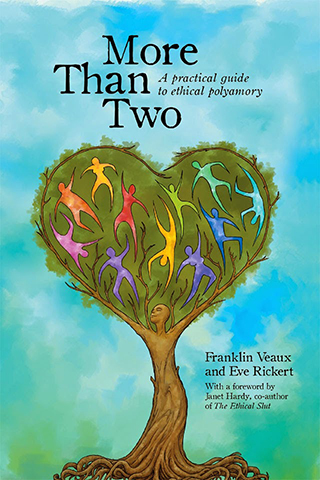A practical guide to ethical polyamory by Franklin Veaux
I was speaking with Franklin about his soon to be released book More Than Two and he did this great post for us:-
Polyamory.
Put simply, it’s the practice of having more than one romantic relationship at the same time, with the full knowledge and consent of all the people involved. I’ve been polyamorous my entire adult life, since before the word was in circulation. In the past few years, interest and awareness about this way of living has exploded. Whether it’s a TV show on cable playing up people having sex with lots of other people, conservatives fretting that gay marriage will lead to plural marriage, or your next-door neighbor who has been quietly living with two romantic partners for years, everyone’s talking about it. My partner Eve Rickert and I have recently written a book about it, called More Than Two: A practical guide to ethical polyamory.
 More and more people are rethinking monogamy and deciding to give polyamory a try. It’s a wonderful, richly rewarding way to live, and I’ve found it can create a life of abundant love. It can also, as many people learn, create conflict and strife if it isn’t approached with compassion, integrity, and respect.
More and more people are rethinking monogamy and deciding to give polyamory a try. It’s a wonderful, richly rewarding way to live, and I’ve found it can create a life of abundant love. It can also, as many people learn, create conflict and strife if it isn’t approached with compassion, integrity, and respect.
Here are three ways you can begin exploring polyamory without having it blow up in your face.
1. Don’t try to script your relationships.
When people come to polyamory, they often (though not always) already have a romantic partner. It’s natural to want to protect an existing relationship.
That can make you try to set out roadmaps of exactly how your relationships will look. It might be tempting, for example, to say, “We don’t want either one of us to feel jealous or left out, so we’ll tell any new person we meet that they have to date both of us.” Or, “I don’t want my existing partner to feel threatened, so any new relationships will always come second to my existing relationship.” Even if you start without an existing relationship, as a single person open to exploring polyamory, it can be tempting to try to lay out in advance what your future relationships will look like.
The problem with this approach is that it doesn’t work very well. People are human beings, not interchangeable car parts. Deal with insecurity, jealousy, or fear of being abandoned before you get involved with someone new! Leave room for new relationships to grow naturally. Don’t try to tell people to be intimate with each other if they don’t want to be; allow people to choose for themselves how to relate to each other. And above all else, remember that people like to have a voice in their romantic relationships. If you try to script how new people will fit into your existing life, you will have trouble finding anyone who’s interested. Relationships aren’t about fitting people into the empty places in your life–they’re about finding places for the people in your life.
2. Trust your partner.
We’ve all been told from the time we are young that monogamy is the “right” way to be, and if your lover is interested in someone else, look out! It means you aren’t good enough, and you’re on a one-way train to being replaced.
That programming can stick even when we try to explore polyamory. It can be hard to stop those little whispering voices that tell us if we aren’t careful, our partner will leave us. So naturally, that can make us try to hold on tightly to our partner. Creating lists of rules and agreements to control our partner’s behavior and keep our partner from leaving seems like a sensible thing. “I want to be the one you love the most!” we might say. Or perhaps it’s “I want to be able to tell you to break up with anyone else you might get involved with, in case you date someone who tries to come between us.”
This also doesn’t work. Either your partner loves and cherishes you (in which case, she will make choices that nurture and support your relationship), or your partner doesn’t (in which case, any controls you try to pace on her to try to keep her aren’t going to work).
Trust—real trust—is hard. Our inner fears and insecurities have sneaky ways of telling us the people we love will leave us if we aren’t forever vigilant. It can be tough to accept the idea that if we give those we love absolute freedom to do whatever they want to do, they will do things to support us, because they love us and want to be with us. But if that isn’t true, why are they there?
People are different from Spanish doubloons, exotic sports cars, and antique Grecian urns in one important way: people can’t be stolen. If someone tries to take your partner away from you, trust him to just say “no.” If he doesn’t want to leave, nobody can make him.
It takes courage to trust someone you love. But the truth is, there’s an inverse relationship between control and love. We keep those we love near us by being the best versions of ourselves, by striving every day to add value to their lives…not by trying to control them to make them stay.
Talk about your needs, be open about your fears and vulnerabilities, and trust your partner to take care of you because that’s what she wants to do.
3. Polyamory will change things.
Often, people new to polyamory will ask, “How can we explore polyamory without it changing what we already have?”
The answer is: you can’t.
Life is change. Remember when you met your first love? Remember when you moved away from home for the first time? Remember when you had a kid? Everything changed. All the choices we make change our lives. Moving in with your partner, moving to a new city, taking a new job, getting married, having children…even getting a pet will change your relationship. We understand this, we accept that the benefits are worth it, and we work with our partners to make the change positive.
Polyamory will change your relationship. It’s going to happen. Relax, take a deep breath, because that’s okay. Approach your relationships with compassion and grace, be flexible, and always remember that the whole point is love. Do those things, and you’ll be okay.
Throughout the decades I’ve been involved in multiple committed romantic relationships, I’ve found that the keys to making things work are to be compassionate, communicate, listen, be flexible, have faith that your partner loves you, and always, always to move in the direction of greatest courage. Polyamory is scary. It will challenge the things you’ve been taught to believe. It will expose weaknesses in your communication skills. It will not fix problems in any existing relationship you may have; just the opposite, it will put greater pressure on them. It demands commitment, love, responsibility, and confidence.
My partner Eve and I have put the lessons we’ve learned and the wisdom we’ve gained from our own experiences (and especially, our own mistakes!) and the experiences of many others into our book More Than Two. It offers practical, boots-on-the-ground advice and tools for navigating the world of polyamory. If you’re interested in exploring polyamorous relationships, we invite you to check it out! It comes out on September 2, and is available now for pre-order on Amazon and other online bookstores.






